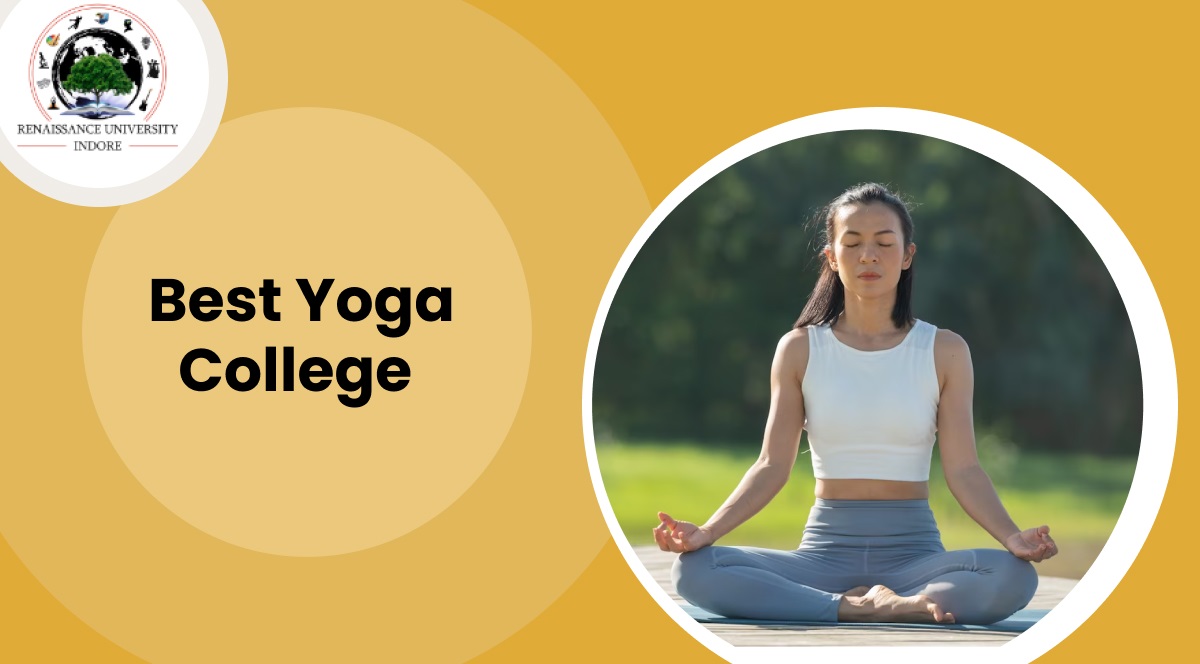Yoga has been practiced in India for thousands of years, with its origins dating back to the Indus Valley Civilization. The earliest written records of yoga can be traced back to the Vedas, a collection of ancient Hindu scriptures. Yoga was originally developed as a spiritual practice, aimed at achieving enlightenment and self-realization. It was later codified by the sage Patanjali in his famous work, the Yoga Sutras, which outlined the eight limbs of yoga. Over the centuries, yoga has evolved into a holistic system of physical, mental, and spiritual practices, and today, it is one of the most popular forms of wellness and fitness across the world. Let’s uncover the guide for Diploma in Yoga India and Fees, Syllabus, Jobs and Yoga Courses in India.
Importance of yoga in modern times
In modern times, the importance of yoga has only increased as people have become more conscious about their health and well-being. Yoga offers a holistic approach to fitness and wellness, encompassing not just physical exercise, but also mental and spiritual practices. Yoga helps to improve flexibility, strength, and balance, and it also helps to reduce stress and anxiety, improve sleep, and boost overall well-being. With the rise of sedentary lifestyles and chronic health conditions, such as obesity, diabetes, and heart disease, yoga has emerged as a powerful tool to combat these issues. In addition, yoga is accessible to people of all ages and fitness levels, making it a truly inclusive practice. As a result, yoga has become increasingly popular around the world, with millions of people embracing it as a way of life.
Benefits of Practicing Yoga
There are numerous benefits of practicing yoga, which can be categorized into physical, mental, and spiritual:
- Physical Benefits: Yoga helps to improve flexibility, strength, and balance, which can reduce the risk of injury and improve overall physical health. It can also help to relieve pain and stiffness in the body and improve cardiovascular health.
- Mental Benefits: Yoga can help to reduce stress and anxiety and improve mental clarity and focus. It can also improve mood and promote feelings of calm and relaxation.
- Spiritual Benefits: Yoga can help to cultivate a sense of inner peace and harmony, and promote a deeper connection to oneself and others. It can also help to develop a greater sense of compassion and empathy.
In addition, yoga is a low-impact form of exercise that is accessible to people of all ages and fitness levels. It can be practiced anywhere, at any time, with minimal equipment, making it an easy and convenient way to maintain physical and mental health.
The typical duration of different yoga courses( Duration of Yoga Courses)
The duration of different yoga courses in India can vary depending on the program and the level of expertise being offered. Below are some of the typical durations for different types of yoga courses:
- Short-term courses:
- Introductory courses: 1-2 weeks
- Beginner courses: 2-3 weeks
- Advanced courses: 1-2 weeks
- Long-term courses:
- 200-hour yoga teacher training: 4-6 weeks
- 300-hour yoga teacher training: 6-8 weeks
- 500-hour yoga teacher training: 8-12 weeks
- Advanced yoga courses: 6 months to 2 years
It’s important to note that the duration of a course can vary depending on the institute and the curriculum being offered. Additionally, some institutes may offer flexible timings for their courses, allowing students to complete the program at their own pace. Therefore, it’s important to research the course duration and curriculum of the institute before enrolling.
Importance of finding affordable and quality courses
Finding affordable and quality yoga courses is important for several reasons:
- Accessibility: Affordable courses make yoga accessible to a wider audience, regardless of their financial status. This is particularly important in a country like India where many people may not have the resources to invest in expensive courses.
- Quality of education: Quality courses ensure that students receive a well-rounded education and the necessary skills and knowledge to become competent yoga teachers or advanced practitioners. The quality of education is especially important in the yoga industry as there are no regulations governing the teaching of yoga.
- Reputation: Choosing a reputable and quality institute can enhance the reputation of the student, making them more attractive to prospective employers or clients.
- Safety: Yoga is a physical practice, and a quality course will ensure that students learn proper techniques and safety measures to prevent injury.
Therefore, finding affordable and quality yoga courses is crucial for both the students and the yoga industry as a whole. It helps to create a more inclusive and accessible environment and promotes the growth of yoga as a wellness and fitness practice.
Career Opportunities In the yoga Industry
The yoga industry in India has seen a significant boom in recent years, with an increasing number of people embracing yoga as a way of life. As a result, the demand for certified yoga teachers and professionals has also increased.
Below are some of the career opportunities available in the yoga industry:
- Yoga Teacher: Certified yoga teachers can work in yoga studios, fitness centers, community centers, or as freelance instructors. They can teach a variety of yoga styles, including Hatha, Ashtanga, Vinyasa, or Restorative yoga.
- Yoga Therapist: Yoga therapists work with individuals who have specific health conditions, such as chronic pain, mental health issues, or respiratory problems. They use yoga as a complementary therapy to promote healing and wellness.
- Yoga Studio Owner: Yoga studio owners can operate their own yoga studio, offering a range of yoga classes and workshops. They can also provide additional services such as massage therapy, nutrition counseling, or meditation classes.
- Yoga Retreat Organizer: Yoga retreat organizers plan and host yoga retreats for individuals or groups, both domestically and internationally. They offer a unique and immersive experience that combines yoga, meditation, and wellness practices.
- Yoga Writer or Blogger: Yoga writers or bloggers can create content for websites, blogs, or social media platforms related to yoga, wellness, and fitness. They can also write books or articles on the subject.
The yoga industry offers a range of exciting and rewarding career opportunities. With the right education and training, individuals can pursue their passion for yoga and turn it into a fulfilling and sustainable career.
Career/ jobs available For yoga professionals
Yoga professionals have a wide range of career opportunities available to them. Some of the jobs available for yoga professionals in India are:
- Yoga Instructor: A yoga instructor’s main role is to teach yoga postures, breathing techniques, and meditation practices to individuals or groups. Yoga instructors can work in yoga studios, fitness centers, or community centers.
- Yoga Therapist: Yoga therapists work with individuals who have specific health conditions, such as chronic pain, mental health issues, or respiratory problems. They use yoga as a complementary therapy to promote healing and wellness.
- Yoga Studio Manager: A yoga studio manager is responsible for the daily operations of a yoga studio, which may include scheduling classes, managing staff, and organizing events.
- Yoga Teacher Trainer: A yoga teacher training is responsible for teaching and mentoring aspiring yoga teachers. They design and implement teacher training programs and provide guidance and support to trainees.
- Yoga Retreat Coordinator: A yoga retreat coordinator plans and organizes yoga retreats for individuals or groups, both domestically and internationally. They manage all aspects of the retreat, from transportation and accommodation to yoga classes and activities.
- Yoga Writer/Blogger: A yoga writer/blogger creates content for websites, blogs, or social media platforms related to yoga, wellness, and fitness. They can also write books or articles on the subject.
- Yoga Researcher: A yoga researcher conducts research on the benefits of yoga and its effects on the body and mind. They work in research institutions, universities, or private research firms.
There are many other job opportunities available for yoga professionals, including corporate yoga instructors, online yoga instructors, and yoga product marketers. With the growing popularity of yoga, there is a high demand for qualified and experienced yoga professionals.
Importance of certifications and experience
Certifications and experience are crucial for a successful career in the yoga industry. Here’s why:
- Credibility: A yoga certification from a reputable institute provides credibility to the instructor or therapist. It shows that they have undergone a rigorous training program and have met the standards set by the governing body. This increases the confidence of the students or clients in the instructor’s ability to teach or provide therapy.
- Knowledge and Skills: A yoga certification program provides a comprehensive understanding of the principles and practices of yoga. It equips the instructor with the necessary knowledge and skills to teach yoga safely and effectively. Experience helps the instructor to apply this knowledge and skill in practical situations and gain confidence in their abilities.
- Networking: Certifications from reputed institutes often provide opportunities for networking with other professionals in the industry. This can lead to collaborations, referrals, and exposure to new ideas and practices.
- Legal Requirements: Some countries or states may require yoga instructors to have a specific certification to teach yoga. It is important to check the legal requirements in the region where one plans to practice yoga.
- Professional Growth: Continuing education and advanced training programs can help instructors to develop their skills and knowledge and expand their professional opportunities. Experience also helps the instructor to build their reputation and develop their teaching style.
In conclusion, certifications and experience are essential for a successful career in the yoga industry. It provides credibility, knowledge, skills, and networking opportunities, and helps meet legal requirements. It also helps in professional growth, which is important for a fulfilling and sustainable career in the yoga industry.
Fees of Yoga Courses in India
The fees for yoga courses in India can vary depending on the duration, level, and institute providing the course. Here is a rough estimate of the fees for different types of yoga courses in India:
- Short-term Courses: Short-term courses can range from a few days to a few weeks. The fees for such courses can range from INR 5,000 to INR 20,000 depending on the duration and level of the course.
- Certificate Courses: Certificate courses usually have a duration of 200 hours and can cost anywhere between INR 20,000 to INR 50,000.
- Diploma Courses: Diploma courses can have a duration of 500 hours or more and can cost anywhere between INR 50,000 to INR 1,00,000.
- Degree Courses: Degree courses can have a duration of 3-4 years and can cost anywhere between INR 1,00,000 to INR 3,00,000.
It is important to note that fees for yoga courses can vary significantly depending on the institute providing the course. It is important to research and compare the fees and quality of different institutes before making a decision. Many institutes also offer scholarships or financial aid to deserving candidates.
Popular Yoga Courses in India
India offers a wide range of yoga courses catering to different levels and interests of yoga enthusiasts. Here are some popular yoga courses in India:
- Hatha Yoga Course: Hatha yoga is the most widely practiced yoga style and focuses on physical postures (asanas), breathing techniques (pranayama), and meditation. It is suitable for beginners as well as advanced practitioners.
- Ashtanga Yoga Course: Ashtanga yoga is a dynamic and physically demanding yoga style that involves a set sequence of postures. It is suitable for advanced practitioners looking for a more challenging practice.
- Vinyasa Yoga Course: Vinyasa yoga is a flow-based yoga style that links movement with breath. It is a dynamic and creative practice that focuses on building strength, flexibility, and mindfulness.
- Iyengar Yoga Course: Iyengar yoga is a slow-paced yoga style that focuses on alignment, precision, and the use of props. It is suitable for people with injuries or limitations and those looking for therapeutic practice.
- Kundalini Yoga Course: Kundalini yoga is a spiritual and meditative yoga style that focuses on activating the energy centers (chakras) in the body. It involves a combination of physical postures, breathing techniques, and chanting.
- Yoga Therapy Course: Yoga therapy is a specialized course that focuses on using yoga as a complementary therapy for specific health conditions. It involves a combination of physical postures, breathing techniques, and meditation practices tailored to the individual’s needs.
- Ayurvedic Yoga course: Ayurvedic yoga is a course that combines yoga with the principles of Ayurveda (an ancient system of medicine). It involves a customized practice based on the individual’s Ayurvedic constitution (dosha).
These are just a few popular yoga courses in India. There are many other courses available, including prenatal yoga, kids yoga, and yoga philosophy. It is important to choose a course that aligns with your interests and goals.
Conclusion
In conclusion, India offers a vast array of yoga courses catering to different levels and interests. The popularity of yoga has grown significantly over the years due to its numerous benefits, both physically and mentally. Yoga courses range from short-term courses to degree programs and cover a wide range of styles such as Hatha, Ashtanga, Vinyasa, Iyengar, Kundalini, and Yoga Therapy. The fees for yoga courses can vary depending on the duration, level, and institute providing the course. It is essential to choose an affordable and quality course from a reputable institute. Certification and experience are crucial for a successful career in the yoga industry, and the industry offers various job opportunities, such as yoga instructor, therapist, or Ayurvedic practitioner. With its rich history and tradition, India is an excellent destination for yoga enthusiasts and professionals seeking to deepen their knowledge and skills.






